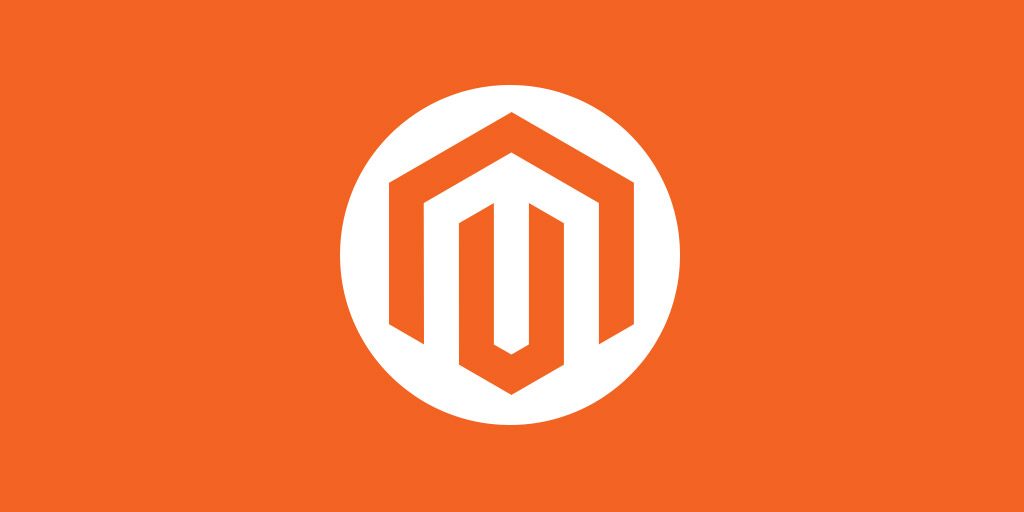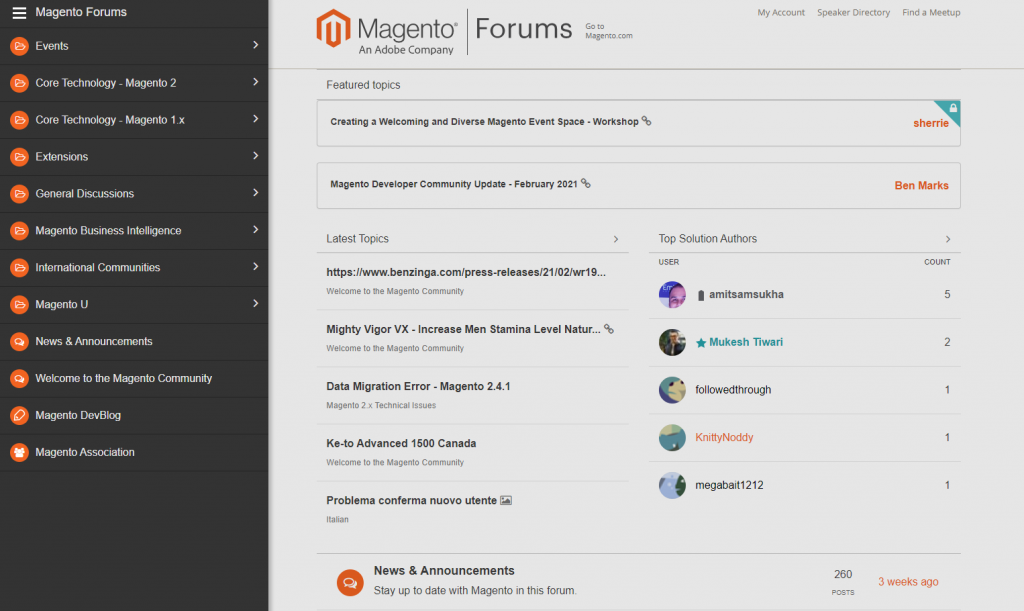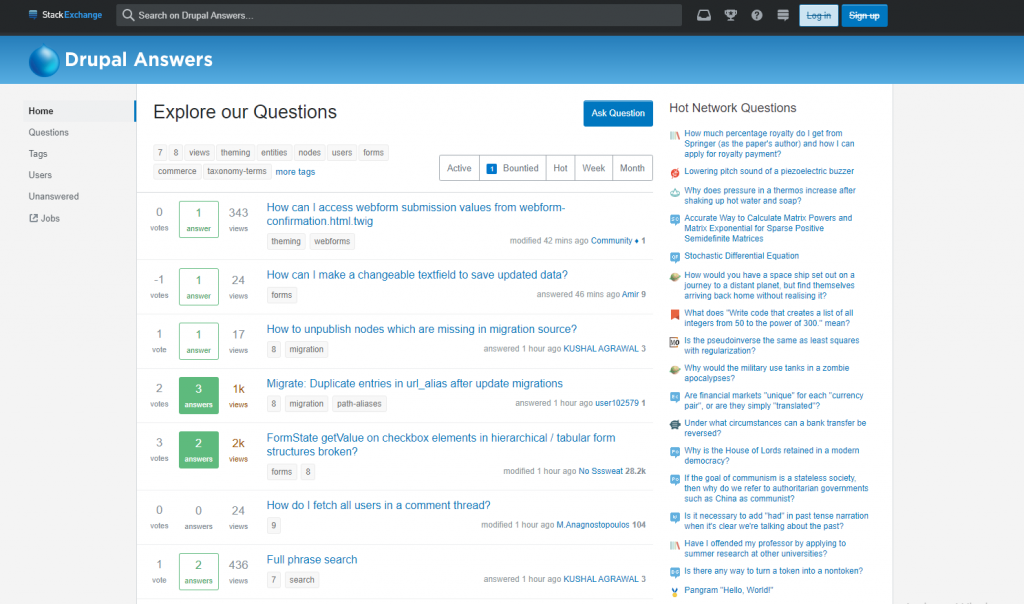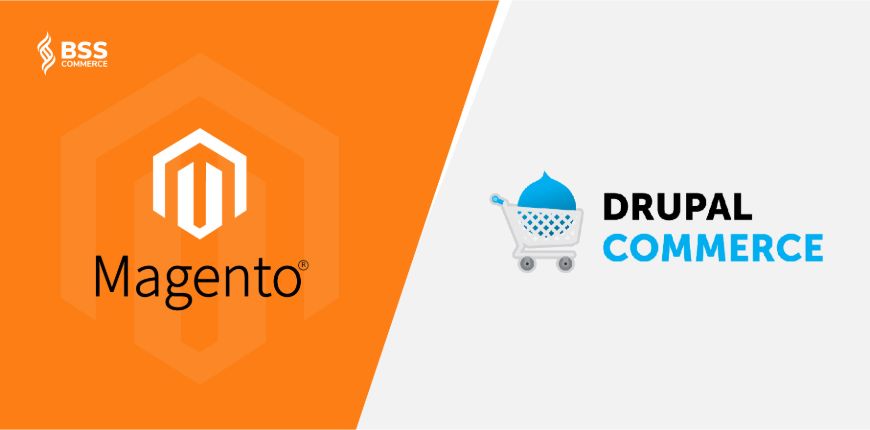You’re at a loss because you still don’t know which platform you should use to build your eCommerce business. You are wondering if Magento or Drupal is beneficial and suitable for your store to thrive and stand out in the market?
Since you have clicked on this article, there’s no need to be confused anymore! In the following part, we’ll provide all the necessary and detailed information for you to make the best decision.
Let’s get started!
I – Magento vs Drupal: Overview
Table of Contents
Magento

Magento is an open-source platform written in PHP, which allows businesses to create their eCommerce websites. It was officially released in 2008 by Varien and has powered more than 250.000 websites so far. There is no doubt that it is among the most used ecommerce platforms globally with various products and versions.
>>> DOWNLOAD our Free Hyva Theme Handbook now to discover in-depth information about this Magento frontend!
Magento includes 2 distinguishing editions:
- Magento Open Source (Community Edition) is a free plan but satisfies most of the basic eCommerce needs. The program code can be easily downloaded and customized to meet the requirements of business owners.
- Magento Commerce (Enterprise Edition) is a much more premium plan with advanced functionalities and official support.
Well-known businesses using Magento: Coca-Cola, Ford, Land Rover, Christian Louboutin, etc.
CHECK OUT How All Magento 2 Features Could You Get On OMG! to get a better understanding of Magento 2!
Drupal

Drupal is another open-source content management framework developed in PHP. Two versions that will be continuously maintained and supported in the years to come are Drupal 7 and Drupal 8. Unlike Magento, this platform can be used to create various types of websites (not only eCommerce websites).
When it comes to engaging with an eCommerce solution, we compare Magento vs Drupal Commerce.
Drupal Commerce is a set of modules for Drupal that brings in a lot of eCommerce functionalities. According to the latest data from Drupal, more than 56.000 projects are using Drupal Commerce. There are 2 Drupal Commerce versions:
- Drupal Commerce 1x: for Drupal 7
- Drupal Commerce 2x: for Drupal 8

(Drupal Commerce usage)
Great examples of websites using Drupal Commerce: https://artellite.co.uk/, https://www.fooda.com/, https://obermeyer.com/, etc.
Both Magento vs Drupal are popular and used by world-class brands. So what are the things they considered to choose between? The following comparison will clear this up.
Other comparisons that you might interested in:
- Magento vs Bigcommerce
- Magento vs Shopify
- Magento vs WooCommerce
- Magento vs OpenCard
- Magento vs Prestashop
II – Magento vs Drupal Commerce Comparison
Scalability
Scalability decides how well your eCommerce website performs in conditions of high traffic, huge inventory, and product management as well. Both Magento vs Drupal are highly scalable.
Magento is the right choice for merchants who plan for a large eCommerce that handles massive amounts of visits and a lot of products in various categories. This robust CMS has no problem coping with 50,000 visits/hour. Magento 2 is a layered architecture of 4 tiers that can be optimized for better performance and scalability, including:
- The client
- The page cache
- The application
- The database
Compared with Magento 1, Magento 2 improves how the application interacts with the browser and reduces the amount of data returned from the server to render web pages. As a result, the platform gives you a much better starting point to build a fast site.
At this point, Drupal is not inferior to Magento. There is no matter to scale a Drupal website with your needs among the online spaces. For this reason, many large firms have chosen Drupal Commerce to run their websites. The only drawback is that Drupal Commerce doesn’t categorize products as deeply.
Tesla is a great example of a huge-traffic website using Drupal.
Features and functionalities
Hitherto, Magento has always been one of the best eCommerce platforms in terms of usability. And it remains so in this post.
Magento was developed with a host of robust features, which allow businesses to offer a seamless experience to their customers. The platform provides not only basic but also advanced eCommerce features. Especially, the Magento 2 Commerce edition comes with numerous premium built-in functionalities that both B2B and B2B merchants want. This option minimizes the need for additional modules, which finally helps you save a lot of effort to find and integrate relevant solutions.
- Customer segmentation
- Gift registries
- Events & Private sales
- Rule-based related products
- Rewards & Loyalty
- Visual merchandiser
- Quick order (B2B)
- Company credit (B2B)
- Quotes (B2B)
- Requisition list (B2B)
- Company account & Sales rep (B2B)
- Shared catalog (B2B)
- …
>>> TRUST ME! You will REGRET if you not CLICKING A Bevy Of Reliable Magento Resources – Even The Savviest Must Know!
At its core, Drupal Commerce is fairly basic with functions like the creation of order processing pages, order tracking, payment processing, shipping features, etc. Besides, it also provides users with these handy features:
- Customized attributes of product pages
- Dynamic product displays
- APIs for common payment gateways
- Calculation of fees and ADS
- Discount pricing
Content management
Drupal is one of the best CMS when it comes to content-driven websites. Therefore, a Drupal Commerce website allows admins to flexibly create different content types with custom fields and attributes. If you are going to build a content-heavy eCommerce site, Drupal Commerce will be much more suitable than Magento.
On the contrary, Magento has a fundamental content management system. It only allows you to add pages and a little content to different categories of pages and attributes to the products. When you need to deliver more content than this, it is recommended to step into its custom domain. This comes with high costs and increased ongoing support.
In a nutshell, Drupal Commerce stays ahead at this point.
DON’T HESITATE to check 4 Recommended Features For Yoast SEO Magento 2. The most worthy recommendation is in front of your eyes!
Learning curve
Magento would be more friendly for tech-minded users, which requires advanced PHP skills. If you are not an experienced hand at coding, you’d better reach out to a dedicated developer or a Magento agency to build and customize your online store. Once coding-related things are handled by tech-savvy, store operation would be much easier with an intuitive admin interface.
Conversely, you can easily work with Drupal Commerce even if you don’t have much coding experience. It is clean and neat with an easy-to-use interface, which both the admins and visitors are looking for.
SEO
Both Magento and Drupal Commerce are good for SEO. However, Magento has a variety of built-in SEO tools on the platform. Meanwhile, you will need some effort to customize Drupal Commerce for SEO.
Magento is the best eCommerce platform when it comes to SEO friendliness. The platform offers basic to out-of-the-box SEO features like Meta tags, Sitemap, Canonical tags, 301 redirects, and so on. Those features enable them to optimize their store’s visibility and rankings on search engines.
In addition to built-in features, merchants can find more extensions from third-party providers to boost SEO. For example, Magento 2 SEO Suite by BSS Commerce is a module of 12 advanced features, that improve your SEO performance in all aspects.
Similarly, SEO is not a problem with Drupal. This powerful platform gives admins the ability to control every web page element with available tools for SEO.
THE MOST Must-To-Know tips of Magento SEO Performance: Reveal 15+ Secret Tips is on the palm of your hand! CHECK IT OUT!
Pricing
Magento
As far as you know, Magento Open Source is free to download and use. However, merchants still have to pay for hosting.
On the other hand, Magento Commerce requires annual payments based on the business’s gross revenue. This seems costly, but you will not be disappointed with the advanced features this premium edition gives you.
In fact, Magento Commerce passes any platform in terms of exclusive functionalities, while other platforms need additional modules for those. Therefore, it is worth the money. If your business has good finance and high requirements for an online store, why don’t you consider this option?
Get a consultation from Magento Development Agency to estimate your development cost.
Drupal
Being an open-source platform, Drupal (with or without Drupal Commerce) is a developer-oriented proposition where the technical cost of entry is free, but the development and maintenance can run into the tens of thousands of dollars or more, depending on your website’s scale and the complexity of web functionalities.
Ongoing maintenance of a Drupal eCommerce website will need certified developers capable of staying on top of updates and critical developments, either in the framework’s open-source roadmap or in your specific eCommerce implementation. They’ll keep the system secure and prepare for essential updates that could compromise core code or 3rd-party modules’ functionality or integrity.
Support
In Magento, levels of support depend on pricing plans.
Users of the Community Edition can search for technical guidelines from publications like Magento DevDocs, Magento Help Center, Magento Forums, and Stack Overflow or get direct support from certified developers and Magento partners. In comparison, users of the Enterprise Edition can experience official support via email or live support.

{Magento Forums}
Online support for Drupal Commerce is offered under the form of questions to the dedicated Drupal Stack Exchange community, as well as a Slack support channel, and a forum. It also has a queued ticketing system and advises on how to get the best out of it. Since Drupal Commerce crosses over so intimately with Drupal, there are currently only 206 questions with that tag on Stack Overflow, compared with nearly 20,000 questions for Drupal.

(Drupal Stack Exchange)
By the way, for merchants confused with too many B2B platform options, you can’t miss details on the B2B features of Magento vs Shopify vs BigCommerce – three giants in the eCommerce world. Fill in the form below and the most complete comparison resource will be delivered to your email in the blink of an eye!
III – Magento Vs Drupal ECommerce: Different Target Market
Was Magento or Drupal Commerce developed for you?
While Drupal was designed for content management, Magento is more ecommerce-driven. You will need to modify Magento to deliver content.
If you position your site as a large online store with out-of-the-box eCommerce experience and smooth performance, don’t hesitate to opt for Magento.
But if you want your website to be content-rich (rather than just an online store looking) where premium eCommerce features are not very necessary, consider using Drupal.
BSS Commerce is one of the leading Magento extension providers and web development services in the world. With experienced and certified Magento developers, we commit to bringing high-quality products and services to optimize your business effectively. Furthermore, we offer FREE Installation – FREE 1-year Support and FREE Lifetime Update for every Magento extension.
CONTACT NOW to let us know your problems. We are willing to support you every time.
MAGENTO 2 EXTENSIONS | FULL WEBSITE DEVELOPMENT SERVICES

